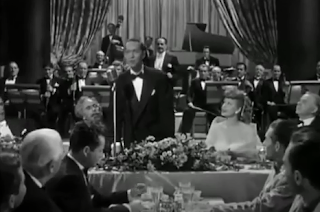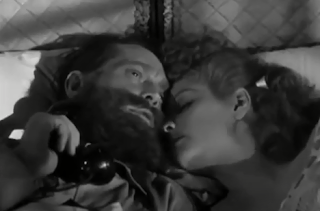 |
| Warren William and Franchot Tone. Scan from my collection. |
Franchot starred in the western comedy Trail of the Vigilantes in 1940. I love this movie for many reasons. It allowed Franchot to take on a role in a genre not offered to him in the previous decade. It paired Franchot with my other favorite actor of 1930s films, Warren William. Finally, it's a fun movie full of physical comedy and Franchot shines in it. Unfortunately, a high quality print of it is not available to watch, but you can view the movie in its entirety on Youtube (click here.)
Author George Fenin, in his 1962 book The Westerns, wrote that the film:
happily disposed of its somewhat witless lampooning in the first four reels, and thereafter got down to the serious business at hand. Much of the action was admittedly tongue-in-cheek, but it was so well-staged with all the customary Universal zip, that no one really minded.
The 1940 publication The Movies...And the People Who Make Them deemed the picture a:
delightful comedy-action western...wild brawls, hectic pursuits and forthright romance handled with a light farcical touch lift the proceedings far above the conventional level.
Even reviewer Bosley Crowther, notorious Franchot detractor, seemed to enjoy Trail of the Vigilantes. He wrote:
And now it seems to be getting so any one who sits long enough in a movie theatre will see every actor he ever knew appear up there on the screen in a Western. This time it is Franchot Tone, that erstwhile Group Theatre hopeful and star in many a super-soigné Eastern, who is playing the rootin' tootin' hero in Universal's "Trail of the Vigilantes," which pulled up yesterday at the Rialto. And, believe it or not, he's okay...The story is pretty routine, but performance is better than average. Mr. Tone wins his spurs in a good, fast Western.
At the moment splitting his time between the stage and the screen, Franchot told reporter George Benjamin that he was enjoying being back on a studio lot and appreciative that he was being offered different roles this time around. He said:
I enjoyed immensely playing in my first Western, Trail of the Vigilantes. Why didn't someone tell me about the horse operas before?
 |
| Franchot Tone and Peggy Moran. Scan from my collection. |
Franchot's leading lady Peggy Moran, in an interview with Mike Fitzgerald for Western Clippings, shared that she was surprised to find Franchot was not a known entity at conventions in which she participated. Peggy recalled:
It was a spoof and of course a big picture—much bigger than the Bs I usually did. A few years ago, I went to Knoxville to a film festival. The late Robert Shayne had told me about stills—getting my best shots reproduced and all. I took some from each of the westerns. The scenes with Gene Autry and Roy Rogers were big sellers. But when it came to the shots of me with Franchot Tone, the fans would ask ‘Who’s that!?’ At first I was so taken aback, because he was a big star, much more so than Gene or Roy, at least at the time. But these fans know who they like—it’s Gene and Roy, not Franchot! But in its day, ‘Vigilantes’ did very well, especially in New York and the sophisticated areas. It was funny, with jokes. A real farce. Franchot would fall off a horse every time he tried to get on it. The dialogue was cute and the metropolitan areas ate it up. But at the festival, I could see what the other westerns meant in that part of the country. Franchot Tone and I dated for a while, but that was before I started going with my future husband.
I think the fact that this was a western convention had something to do with Franchot not being recognized. If it had been a pre-code or 30s-related convention, I think Franchot would've received more love. Also, had the stills been of Franchot's television work in the 1950s and 60s, convention attendees would have surely recognized the older gentleman who starred in episodes of Bonanza, Wagon Train, The Virginian, and Bitter Heritage.
The Film
After a newspaperman is murdered, special investigator Tim Mason, known as Kansas, is assigned to the case. Kansas (Franchot Tone) is required to trade in his tuxedo and city life for western wear and a horse. When Kansas arrives in the western town, it is in complete chaos. Horses, wagons and men run wild in the streets and there seem to be gunshots coming from every direction—the sheriff is even handcuffed to a building! Within minutes of arriving, Kansas finds himself strung from the ceiling of the saloon. Ill-prepared for battle, Kansas fends off the posse in a mixture of pushing, quips, and occasional punches. |
| Franchot in Trial of the Vigilantes. Scan from my collection. |
 |
| Source: The Movies and The People Who Make Them (1940) |


























